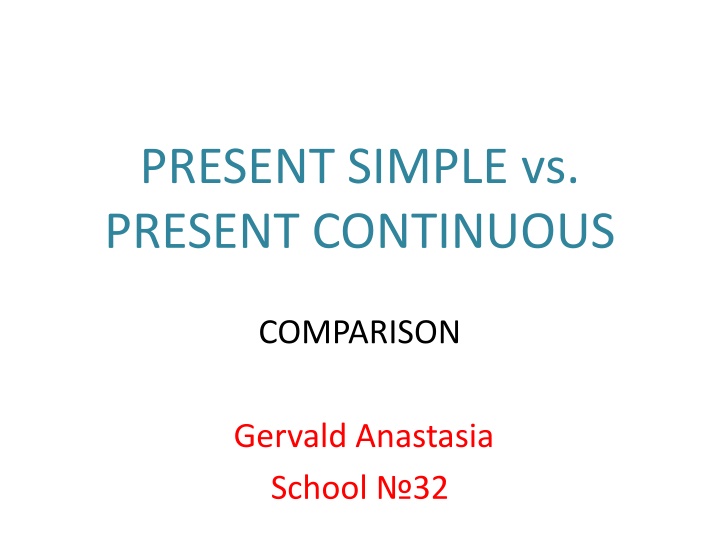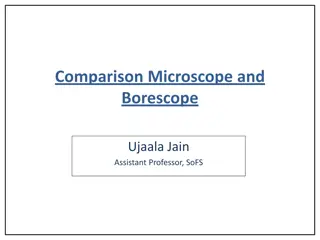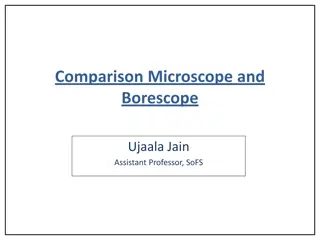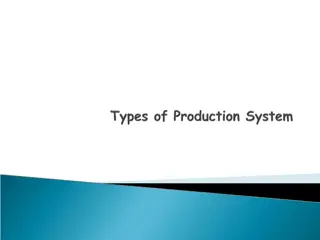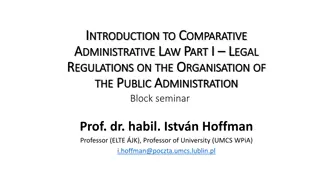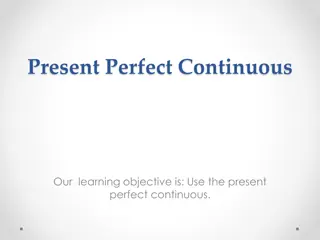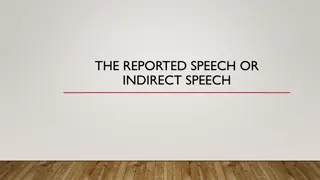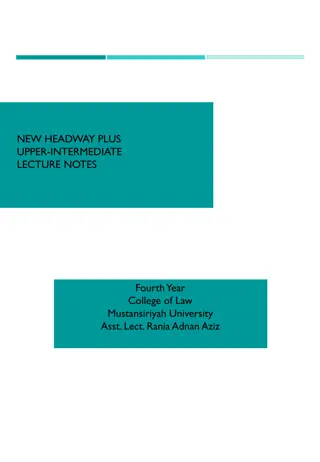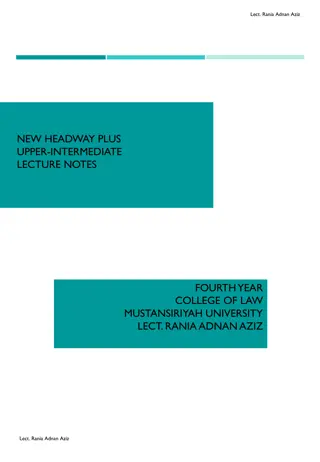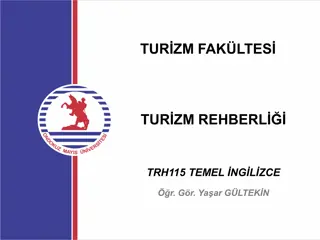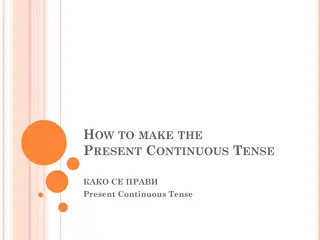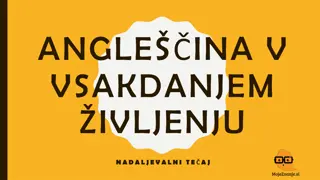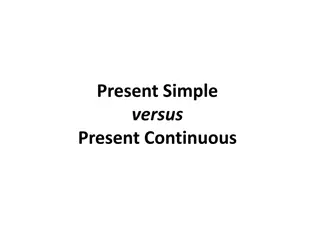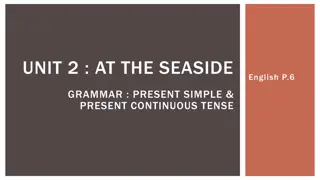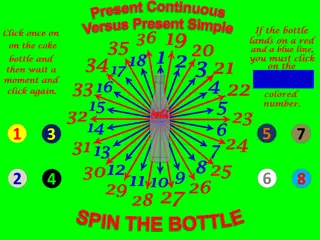Present Simple vs Present Continuous Comparison
Gervald and Anastasia are comparing the usage of Present Simple and Present Continuous tenses in different contexts. Explore the nuances between these two common verb tenses and understand when to use them appropriately to express actions or states happening in the present. Dive into examples from school life to grasp a better understanding and improve your English language skills.
Uploaded on Feb 16, 2025 | 2 Views
Download Presentation

Please find below an Image/Link to download the presentation.
The content on the website is provided AS IS for your information and personal use only. It may not be sold, licensed, or shared on other websites without obtaining consent from the author.If you encounter any issues during the download, it is possible that the publisher has removed the file from their server.
You are allowed to download the files provided on this website for personal or commercial use, subject to the condition that they are used lawfully. All files are the property of their respective owners.
The content on the website is provided AS IS for your information and personal use only. It may not be sold, licensed, or shared on other websites without obtaining consent from the author.
E N D
Presentation Transcript
PRESENT SIMPLE vs. PRESENT CONTINUOUS COMPARISON Gervald Anastasia School 32
PRESENT SIMPLE Affirmative Form I You We They + V We speak English He She It + V s/es He speaks English
PRESENT SIMPLE Negative Form I You We They + DON T+ V We don t speak English He She It + DOESN T+ V He doesn t speak English
PRESENT SIMPLE Interrogative Form DO + I You We They + V ? Do we speak English? Yes,we do/ No,we don t DOES + He She It + V ? Does he speak English? Yes, he does/ No, he doesn t
USE Daily routines/ Repeated actions/ Habits/ Permanent states/ Signals: Usually Always Sometimes Often Seldom/Rarely Every day/week/month/year/morning/evening
Exercises 1. Choose the correct form. He (have/has) three sisters. Tom (cook/cooks) quite well. I (come/comes) home very late. My parents (watch/watches)TV in the evening. Mary (take/takes) the dog for a walk in the evenings. All children (like/likes) chocolate. I (make/makes) my bed in the morning.
Exercises 2. , don t doesn t. We listen to the radio every night. Mr Johnson have a private office. The boys study at the library every day. The men always eat at that cafe. That tall man work for this company. The people speak English very well.
Exercises Complete the questions with do or does. ...... she take her gog for a walk in the morning? ...... your friend Paul work in the shop over there? ...... they know the answers to the exam? ...... your parents know that you smoke? .... Bill teach maths? Where ....... your sister live? What time ...... the lessons finish? ..... you go to the coast in summer? .... it rain very often in Ireland? Why ...... they ask so many questions in class?
PRESENT CONTINUOUS Affirmative Form + to Be + Ving I + am + Ving I m playing tennis. He She It + IS + Ving The dog is barking. You We They + Are + Ving They are watching TV. Signals: NOW, AT THE MOMEHT
PRESENT CONTINUOUS Negative Form + to Be + not + Ving I m+not + Ving I m not playing tennis. He She It + Isn t + Ving The dog isn t barking. You We They + Aren t + Ving They aren t watching TV.
PRESENT CONTINUOUS Interrogative Form To Be + + Ving Am + I + Ving? Am I playing tennis? He She It + IS + Ving? The dog is barking? You We They + Are + Ving? They are watching TV?
USE Actions happening NOW, at the moment of speaking/ , Actions happening AROUND the time of speaking/ , Temporary situations/ A fixed arrangement in the near future/
Exercises It is 8 o clock now. Granny (cooks/ is cooking) breakfast. Every day father (leaves/is leaving) the house at half past nine. Now it is half past eight. Father (leaves/is leaving) the house. We often (watch/are watching) TV. Now we (sit/ are sitting) in armchairs and (watch/are watching) TV. Sometimes Mike (does/is doing) his lessons in the evening. Look at Mike. He (does/is doing) his lessons. It often (rains/is raining) in October. It (rains/is raining) now. Usually the family (has/is having) tea at 5 o clock. It is 5 o clock now. The family (has/is having) tea. It sometimes (snows/is snowing) here in April. It (snows/is snowing) now. Every morning mother (cooks/is cooking) breakfast for us.
Exercises often __________(go) to the cinema. My friends _________(watch) TV at the moment. She ________(write) letters to her mother every week. Sarah usually __________(drive) to work. Father _______(sit) on the sofa now. Listen. The telephone __________ (ring). Tim_________(study) a new language every year. We always __________(spend) the summer in York. In summer we usually __________(go) to the seaside. Look at Tom. He _________ (ride) a horse. He often ___________(watch) birds in summer. Don t ask me now. I _________(write) an exercise. She usually ________(watch) television in the evening. I ____________(play) the piano every day.
